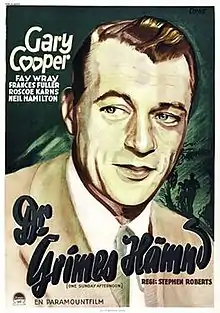One Sunday Afternoon
One Sunday Afternoon is a 1933 American pre-Code romantic drama film directed by Stephen Roberts and starring Gary Cooper and Fay Wray. Based on the 1933 Broadway play by James Hagan,[1][2] the film is about a middle-aged dentist who reminisces about his unrequited love for a beautiful woman and his former friend who betrayed him and married her. This pre-Code film was released by Paramount Pictures on September 1, 1933.
| One Sunday Afternoon | |
|---|---|
 Swedish theatrical release poster | |
| Directed by | Stephen Roberts |
| Produced by | Louis D. Lighton |
| Screenplay by | |
| Based on | One Sunday Afternoon 1933 play by James Hagan |
| Starring | |
| Music by | John Leipold |
| Cinematography | |
| Edited by | Ellsworth Hoagland |
Production company | |
| Distributed by | Paramount Pictures |
Release date |
|
Running time | 85 minutes |
| Country | United States |
| Language | English |
Plot
Dr. Lucius Griffith "Biff" Grimes (Gary Cooper) is a small town dentist dissatisfied with his lot. Though married to the lovely and affectionate Amy Lind Grimes (Frances Fuller), Grimes still carries a torch for his former sweetheart, Virginia "Virgie" Brush Barnstead (Fay Wray). Years earlier, Grimes had lost Virgie to his old friend Hugo Barnstead (Neil Hamilton), and is consumed with the desire to get even with his rival. The now-wealthy Hugo has a dental emergency and comes to see Grimes, who comes close to killing his old rival with gas. The story of their past is told in flashback while the anesthetic is taking effect.
Cast
- Gary Cooper as Dr. Lucius Griffith "Biff" Grimes
- Fay Wray as Virginia "Virgie" Brush Barnstead
- Frances Fuller as Amy Lind Grimes
- Roscoe Karns as Snappy Downer
- Neil Hamilton as Hugo Barnstead, Owner Phoenix Carriage Factory
- Jane Darwell as Mrs. Lind, Amy's Mother
- Ed Brady as Pig Contest Emcee (uncredited)
- Robert Homans as Officer Charlie Brown (uncredited)
Reception
The film was a box office disappointment for Paramount.[3]
Mordaunt Hall reviewed the film for The New York Times in September 1933, while the play was still running, and it suffered by comparison to the original: "...Hollywood loses no time in picturing a good play... One might venture that the studio chieftains have been a little too hasty in this case, for, although the shadow conception of "One Sunday Afternoon" is not without merit, it often fails in the dramatic impact given in the original, especially in the closing episodes. Like the film versions of one or two other plays... There are periods that are unnecessarily short and others that do not deserve the footage they receive." [4]
Leonard Maltin gives it three out of four stars, praising Cooper's performance in a "Touching and lovingly made piece of Americana, exuding period charm and atmosphere, though darker in tone than the two Warner Bros. remakes by Raoul Walsh: "[5]
Original and Remakes
The hit play One Sunday Afternoon, starring Lloyd Nolan, ran on Broadway from Feb. 15 to November 1933.[1] Written by James Hagan (1888–1947), it had great success beyond its Broadway run .[6] The New York Times' critic Brooke Atkinson called it "a light and charming little fable" and "uncommonly refreshing."[6] It was translated into Yiddish and retitled One Sabbath Afternoon. A 1939 production of the Yiddish version also received high praise from The New York Times.[7]
Film Director Raoul Walsh made two versions, the smash hit Strawberry Blonde (1941) with James Cagney as Biff, and a Technicolor musical starring Dennis Morgan called One Sunday Afternoon (1948). The Gary Cooper version was a notorious flop, however; it was the only Cooper picture of this period to lose money at the box office.[8] Before making the Cagney version, Jack L. Warner (co-founder of Warner Bros., who had bought the earlier version) screened the 1933 film and then wrote a memo to his production head, Hal B. Wallis, telling him to watch it: "It will be hard to stay through the entire running of the picture, but do this so you will know what not to do."[8]
See also
- List of Pre-Code films
References
- One Sunday Afternoon at the Internet Broadway Database
- Hagan, James (1933). One Sunday Afternoon. S. French. OCLC 2272619.
- D. W. (Nov 25, 1934). "TAKING A LOOK AT THE RECORD". New York Times. ProQuest 101193306.
- Hall, Mordaunt (1933-09-02). "Gary Cooper and Fay Wray in a Film Version of the Play, "One Sunday Afternoon."". The New York Times. ISSN 0362-4331. Retrieved 2020-04-03.
- "One Sunday Afternoon (1933) – Overview – TCM.com". Turner Classic Movies. Retrieved 2020-04-03.
- "JAMES HAGAN DIES; STAGE, FILM WRITER; Author of the Hit Comedy, 'One Sunday Afternoon'uFormer Show Manager, Actor". timesmachine.nytimes.com. Retrieved 2020-04-03.
- "THE PLAY; 'One Sunday Afternoon' Seen". timesmachine.nytimes.com. Retrieved 2020-04-03.
- Moss, Marilyn Ann (2011). Raoul Walsh: The True Adventures of Hollywood's Legendary Director. Lexington, Kentucky: The University Press of Kentucky. ISBN 978-0-8131-3393-5. p. 199
External links
- One Sunday Afternoon at IMDb
- One Sunday Afternoon at AllMovie
- One Sunday Afternoon at the TCM Movie Database
- One Sunday Afternoon at the American Film Institute Catalog
- One Sunday Afternoon at Rotten Tomatoes
| This article about a 1930s romantic drama film is a stub. You can help Wikipedia by expanding it. |